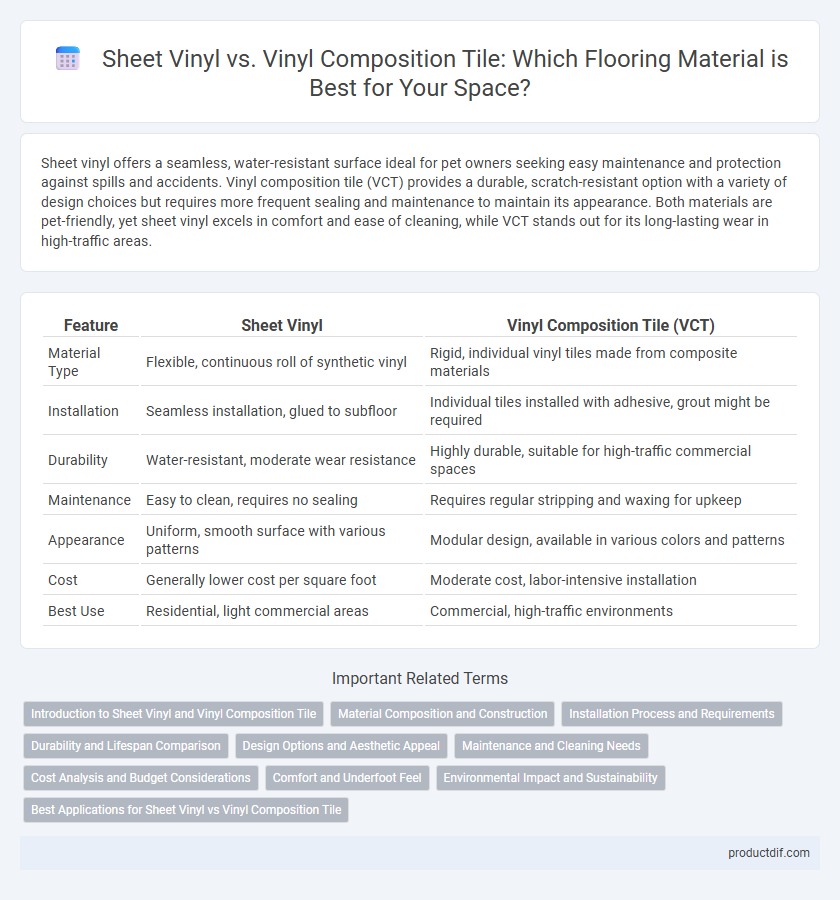Sheet vinyl offers a seamless, water-resistant surface ideal for pet owners seeking easy maintenance and protection against spills and accidents. Vinyl composition tile (VCT) provides a durable, scratch-resistant option with a variety of design choices but requires more frequent sealing and maintenance to maintain its appearance. Both materials are pet-friendly, yet sheet vinyl excels in comfort and ease of cleaning, while VCT stands out for its long-lasting wear in high-traffic areas.
Table of Comparison
| Feature | Sheet Vinyl | Vinyl Composition Tile (VCT) |
|---|---|---|
| Material Type | Flexible, continuous roll of synthetic vinyl | Rigid, individual vinyl tiles made from composite materials |
| Installation | Seamless installation, glued to subfloor | Individual tiles installed with adhesive, grout might be required |
| Durability | Water-resistant, moderate wear resistance | Highly durable, suitable for high-traffic commercial spaces |
| Maintenance | Easy to clean, requires no sealing | Requires regular stripping and waxing for upkeep |
| Appearance | Uniform, smooth surface with various patterns | Modular design, available in various colors and patterns |
| Cost | Generally lower cost per square foot | Moderate cost, labor-intensive installation |
| Best Use | Residential, light commercial areas | Commercial, high-traffic environments |
Introduction to Sheet Vinyl and Vinyl Composition Tile
Sheet vinyl flooring is a continuous, flexible material made from synthetic polymers, offering seamless installation and water resistance ideal for kitchens and bathrooms. Vinyl Composition Tile (VCT) consists of durable, pressed vinyl tiles blending polyvinyl chloride with limestone, providing high resistance to heavy foot traffic common in commercial spaces. Both flooring options deliver versatile design choices and ease of maintenance but differ in installation methods and durability suited for varying environments.
Material Composition and Construction
Sheet vinyl flooring consists of a continuous flexible sheet made primarily from polyvinyl chloride (PVC) combined with plasticizers, providing a resilient, waterproof surface. Vinyl Composition Tile (VCT) is composed of a mixture of natural limestone, fillers, thermoplastic binders, and pigments, compressed into a rigid tile format that requires regular maintenance and sealing. The construction of sheet vinyl allows for seamless installation and flexibility, while VCT offers durability through its composite structure but demands more intensive upkeep.
Installation Process and Requirements
Sheet vinyl installation involves rolling out large, flexible sheets that require a smooth, clean subfloor and precise cutting to fit the area, often necessitating adhesive application for secure placement. Vinyl composition tile (VCT) installation demands meticulous subfloor preparation, including leveling and cleaning, followed by laying individual tiles in a specific pattern using glue, allowing for easier repairs or replacements. Both materials require professional tools and expertise, but sheet vinyl typically offers faster installation with fewer seams compared to the more labor-intensive and pattern-sensitive VCT process.
Durability and Lifespan Comparison
Sheet vinyl typically offers a more seamless surface with fewer joints, reducing points of wear and increasing its overall durability, making it ideal for high-moisture environments. Vinyl composition tile (VCT) tends to be more susceptible to chipping and requires regular maintenance such as stripping and waxing to maintain its lifespan, which usually ranges between 10 to 20 years depending on usage. Sheet vinyl generally has a lifespan of 15 to 25 years when properly maintained, outperforming VCT in both longevity and resistance to daily wear and tear.
Design Options and Aesthetic Appeal
Sheet vinyl offers extensive design versatility with continuous, seamless patterns that mimic natural materials like wood and stone, creating a sleek and uniform aesthetic. Vinyl composition tile (VCT) provides customizable designs through individual tile placement, enabling intricate patterns and color combinations for a classic, textured look. Both materials deliver durable flooring solutions, but sheet vinyl excels in fluid, modern visuals, while VCT emphasizes traditional, modular design appeal.
Maintenance and Cleaning Needs
Sheet vinyl requires minimal maintenance due to its continuous, seamless surface that prevents dirt accumulation and moisture infiltration, making it easy to clean with regular sweeping and mopping. Vinyl composition tile (VCT) demands more intensive upkeep, including frequent stripping, waxing, and buffing to maintain its appearance and protect against wear and tear. Both materials resist stains well, but sheet vinyl's non-porous surface significantly reduces the risk of grime buildup in seams compared to VCT.
Cost Analysis and Budget Considerations
Sheet vinyl typically offers a lower upfront cost compared to vinyl composition tile (VCT), making it a more budget-friendly option for large-scale or residential projects. VCT, while often more expensive initially due to installation and maintenance needs, provides long-term durability and easier repair options, potentially reducing lifecycle costs. Budget considerations should include not only material price but also installation complexity, maintenance expenses, and expected lifespan to determine overall cost-effectiveness.
Comfort and Underfoot Feel
Sheet vinyl offers a smoother, more cushioned underfoot feel due to its continuous, flexible surface, making it ideal for prolonged standing or walking. Vinyl Composition Tile (VCT) tends to be harder and less forgiving underfoot because it consists of compressed layers of vinyl chips, resulting in a firmer texture. Enhanced backing options in sheet vinyl can further improve comfort by adding padding and reducing fatigue compared to the rigid structure of VCT.
Environmental Impact and Sustainability
Sheet vinyl flooring typically has a lower environmental impact than vinyl composition tile (VCT) due to its use of fewer raw materials and lower waste generation during installation. VCT often requires more frequent maintenance and polishing with chemical cleaners, increasing its environmental footprint. Both materials can include recycled content, but sheet vinyl's improved durability and longer lifespan contribute to greater sustainability over time.
Best Applications for Sheet Vinyl vs Vinyl Composition Tile
Sheet vinyl is ideal for residential bathrooms and kitchens due to its seamless surface that resists moisture and stains, providing easy maintenance. Vinyl composition tile (VCT) excels in commercial settings like schools and hospitals, offering durability and easy replacement of individual tiles. Both materials support high foot traffic, but sheet vinyl's flexibility suits curved or irregular spaces, while VCT is preferred for straightforward, heavy-duty installations.
Sheet Vinyl vs Vinyl Composition Tile Infographic

 productdif.com
productdif.com